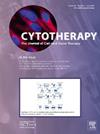Hypoimmune FK binding protein 12-knockout CD19 CAR T cells achieve deep tissue B-cell depletion and control Nalm6 tumors in immunosuppressed humanized mice
IF 3.2
3区 医学
Q2 BIOTECHNOLOGY & APPLIED MICROBIOLOGY
引用次数: 0
Abstract
Autologous chimeric antigen receptor (CAR) T-cell therapy in solid-organ transplant recipients on life-long systemic immunosuppression has so far been disappointing. The mTOR inhibitors tacrolimus (Tac) and rapamycin (Rapa) are among the most common immunosuppressive drugs. While they prevent organ allograft rejection, they also suppress the efficacy and persistence of the CAR T-cell product. A reduction in immunosuppression is usually recommended before leukapheresis and after infusion of the final CAR therapeutic to facilitate CAR T-cell activity. However, this reduction jeopardizes allograft survival and multiple graft failures have been reported. Here, we report the engineering of allogeneic, human CD19 CAR T cells that are resistant to mTOR inhibitors through the knockout of FK-binding protein 12 (FKBP-KO). Both HLA-replete WT-FKBP-KO and hypoimmune (HLA class I- and II-depleted and CD47-overexpressing, HIP) CD19 CAR T cells maintained effective in vitro killing capacity of benign human B cells and malignant Nalm6 tumor cells when incubated with high Tac and Rapa concentrations. CAR T cells without the FKBP-KO failed to kill both targets in the presence of Tac or Rapa. HIP-FKBP-KO CAR T cells were able to fully evade cytotoxicity from primed allogeneic T cells, natural killer (NK cells), and macrophages. When injected into immunosuppressed Nalm6-bearing humanized mice, only the HIP-FKBP-KO CAR T cells achieved persistence and deep tissue depletion of CD19+ cells over a 25-day study period, whereas the WT-FKBP-KO CAR T cells diminished in number and efficacy. Allogeneic HIP-FKBP-KO CAR T cells may treat post-transplant lymphoproliferative disease effectively in solid organ transplant recipients maintained on immunosuppression.
在免疫抑制的人源化小鼠中,低免疫FK结合蛋白12敲除CD19 CAR - T细胞实现深层组织b细胞消耗并控制Nalm6肿瘤。
自体嵌合抗原受体(CAR) t细胞治疗实体器官移植受者终身全身免疫抑制迄今为止令人失望。mTOR抑制剂他克莫司(Tac)和雷帕霉素(Rapa)是最常见的免疫抑制药物。它们在防止器官异体移植排斥的同时,也抑制了CAR - t细胞产物的有效性和持久性。通常建议在白细胞分离前和最终CAR治疗输注后减少免疫抑制,以促进CAR - t细胞的活性。然而,这种减少危及同种异体移植物的生存和多次移植物失败的报道。在这里,我们报道了通过敲除fk结合蛋白12 (FKBP-KO)对mTOR抑制剂具有抗性的同种异体人CD19 CAR - T细胞的工程。在高Tac和Rapa浓度的条件下,充满HLA的WT-FKBP-KO和低免疫(HLA I类和ii类缺失和cd47过表达,HIP) CD19 CAR - T细胞在体外都能保持对良性人B细胞和恶性Nalm6肿瘤细胞的有效杀伤能力。没有FKBP-KO的CAR - T细胞在Tac或Rapa存在的情况下无法杀死这两个靶标。HIP-FKBP-KO CAR - T细胞能够完全逃避同种异体T细胞、自然杀伤细胞(NK细胞)和巨噬细胞的细胞毒性。当注射到免疫抑制的携带nalm6的人源化小鼠体内时,在25天的研究期间,只有HIP-FKBP-KO CAR - T细胞实现了CD19+细胞的持续和深层组织消耗,而WT-FKBP-KO CAR - T细胞的数量和效果都有所下降。同种异体HIP-FKBP-KO CAR - T细胞可以有效治疗免疫抑制的实体器官移植受者的移植后淋巴增生性疾病。
本文章由计算机程序翻译,如有差异,请以英文原文为准。
求助全文
约1分钟内获得全文
求助全文
来源期刊

Cytotherapy
医学-生物工程与应用微生物
CiteScore
6.30
自引率
4.40%
发文量
683
审稿时长
49 days
期刊介绍:
The journal brings readers the latest developments in the fast moving field of cellular therapy in man. This includes cell therapy for cancer, immune disorders, inherited diseases, tissue repair and regenerative medicine. The journal covers the science, translational development and treatment with variety of cell types including hematopoietic stem cells, immune cells (dendritic cells, NK, cells, T cells, antigen presenting cells) mesenchymal stromal cells, adipose cells, nerve, muscle, vascular and endothelial cells, and induced pluripotential stem cells. We also welcome manuscripts on subcellular derivatives such as exosomes. A specific focus is on translational research that brings cell therapy to the clinic. Cytotherapy publishes original papers, reviews, position papers editorials, commentaries and letters to the editor. We welcome "Protocols in Cytotherapy" bringing standard operating procedure for production specific cell types for clinical use within the reach of the readership.
 求助内容:
求助内容: 应助结果提醒方式:
应助结果提醒方式:


